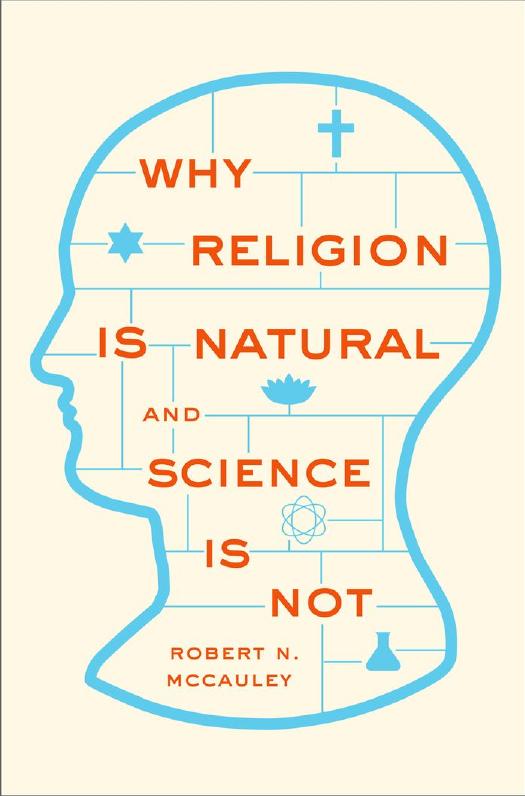Why Religion is Natural and Science is Not by Robert N. McCauley

Author:Robert N. McCauley [McCauley, Robert N.]
Language: eng
Format: mobi, pdf
Publisher: Oxford University Press
Published: 2011-04-10T00:00:00+00:00
Religionâs Cognitively Natural Processes
I have suggested that although maturationally natural systems may not begin as domain-specific capacities, that is certainly what they look like once they have developed. If that is true, then the cognitive processes that religions recruit will prove every bit as diverse as the various maturationally natural systems they engage. Let me lay out some examples.
Undoubtedly, the principal maturationally natural system that religions utilize, but by no means the only one, is theory of mind. But letâs first examine two others: language and the management of contaminants.
Scholars have debated whether natural language is a mental module more thoroughly and at greater length than any other cognitive process. Its status as a maturationally natural perceptual, cognitive, and action system, however, is uncontroversial. As Noam Chomsky and his followers have argued, childrenâs creative use of language shows that they acquire formidable competence with their natural languages even though those languages exhibit patterns, forms, and structures that depend on theoretical constructs that are every bit as complex as those employed in the most esoteric areas of science. Even those theorists who disagree with Chomsky about this do not substantially disagree about the levels of childrenâs linguistic accomplishments. They simply explain them differently. Although disputes about natural language swirl with unabated vigor, that it should count as a maturationally natural cognitive system is surely one of the least contentious issues. It is not mere coincidence that we speak of ânatural language.â
That religious systems largely depend on linguistic communication comes as no surprise. So does science. Religion is a human undertaking and human beings are indefatigable language users. There is nothing exceptional about that. In what instances, then, does religion peculiarly draw on language as a maturationally natural system? Perhaps the most striking example is speaking in tongues.
When religious people speak in tongues they produce utterances that appear to be linguistic, at least to an uncritical ear.56 From its beginnings Christianity has included speaking in tongues, but it is by no means the only religion to do so.57 Accounts in the Christian Bible of humans producing what appear to be miraculous linguistic utterances come in at least two varieties. The second chapter of the book of Acts reports that the apostles displayed heteroglossia (or xenoglossia), that is, they spoke known languages that they had never learned. According to this passage, they produced utterances that recognizably sounded like utterances in at least thirteen different languages. The other famous reference to exotic religious utterances is in St. Paulâs first letter to the church in Corinth. In that letterâs twelfth chapter, among the various gifts of the Spirit that he lists are âdivers kinds of tonguesâ and âthe interpretation of tongues.â This has generally been construed as referring to glossolalia, in which people appear to speak in unknown languages that are putatively extinct or divine in origin and, therefore, demand comparably inspired interpretation in order to be understood.58 Under regular circumstances, no one understands them. Pentecostal Christian groups regard the production of glossolalia as evidence of the speakerâs baptism in the Spirit.
Download
Why Religion is Natural and Science is Not by Robert N. McCauley.pdf
This site does not store any files on its server. We only index and link to content provided by other sites. Please contact the content providers to delete copyright contents if any and email us, we'll remove relevant links or contents immediately.
Sapiens: A Brief History of Humankind by Yuval Noah Harari(14368)
The Tidewater Tales by John Barth(12652)
Mastermind: How to Think Like Sherlock Holmes by Maria Konnikova(7323)
Do No Harm Stories of Life, Death and Brain Surgery by Henry Marsh(6938)
The Thirst by Nesbo Jo(6932)
Why We Sleep: Unlocking the Power of Sleep and Dreams by Matthew Walker(6706)
Life 3.0: Being Human in the Age of Artificial Intelligence by Tegmark Max(5549)
Sapiens by Yuval Noah Harari(5366)
The Body: A Guide for Occupants by Bill Bryson(5082)
The Longevity Diet by Valter Longo(5058)
The Rules Do Not Apply by Ariel Levy(4957)
The Immortal Life of Henrietta Lacks by Rebecca Skloot(4579)
Animal Frequency by Melissa Alvarez(4462)
Why We Sleep by Matthew Walker(4434)
The Hacking of the American Mind by Robert H. Lustig(4375)
Yoga Anatomy by Kaminoff Leslie(4358)
All Creatures Great and Small by James Herriot(4311)
Double Down (Diary of a Wimpy Kid Book 11) by Jeff Kinney(4261)
Embedded Programming with Modern C++ Cookbook by Igor Viarheichyk(4173)
